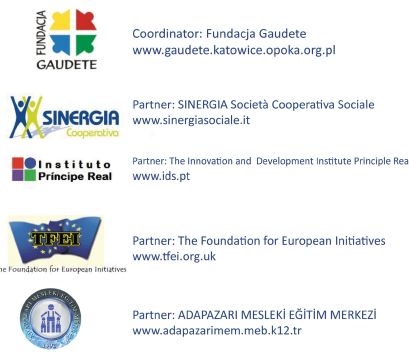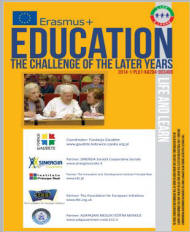This project is an Erasmus+ project approved in 2014. It ran from September 2014 until August 2016.
The aim of the project " Education - The Challenge of the Later Years - Life and Learn" is to improve the education of " third and fourth age people." It will consequently reduce the marginalization of people over 60 years old.
The target group consists of elderly people who need a wider range of educational activities.
It is necessary to create training materials for educators in the areas of leisure, health, talent development. Elderly people meet a number of barriers making their come back to learning difficult. The barriers may include:
(i) perceiving oneself as too old.
(ii) fragile health.
(iii) mobility difficulties.
(iv) lack of companionship.
(v) too little information.
Until the middle of the 20th century, psychological research on the education of older people was dominated by the deficit model. This model describes the process of aging by means of reduced cognitive and intellectual abilities. Currently attention is rather on the resources available for older people. This project responds to these resource needs by providing:
(i) Education based on realistic problems - seeking and
finding solutions to problems.
(ii) Support in dealing with critical moments in an adults’
lives.
(iii) Acquiring new knowledge and skills.
(iv) Overcoming anxiety, fear and, in some cases, shyness.
(v) Inspiring, encouraging and motivating.
|
|
The participants of the project are teachers, coaches,
workers for partner organizations and people over 60 years of
age. The project UK Partner undertook a UK survey which was designed to collect information on the perceptions and opinions about the need for and access to education for people over the age of 60 - download the UK Survey Questionnaire and the results of the responses. The main objective of the project is to improve learning opportunities for older people in partner countries and the specific objectives are: To increase the education of the third and fourth age people. |
Training Modules
Each of the 5 Training Modules introduces the different topics, and also includes local context and experiences. Trainers and Educators can use these Modules in the way that best suits their needs and context, but we have found following scenarios particularly useful:
For experts in a specific subject (educators, teachers, facilitators, trainers) who wish to acquire general knowledge in other fields.
For personnel with limited experience who are keen to know more about the context and potential of senior citizens, and also how education can be shaped to have the greatest impact on seniors’ quality of life.
For training of the vocational training staff who will be working with lifelong learning programmes.
For the wider public (decision makers, social services, volunteer institutions, associations), interested in knowing the potential of education and learning and how they can encourage and reinforce lifelong learning among senior citizens, thereby increasing the benefits.
For further information contact Stephanie Sutton on info@tfei.org.uk

Project Introduction - pdf file
T

This project has been funded with support from the European
Commission. This publication reflects the views only of the
author, and the Commission cannot be held responsible for any
use which may be made of the information contained therein.
© The Foundation for European Initiatives 2012-2019
Multiplier Event, June 2016, London
.jpg)
TRAINING MODULES
Module
1 -
Teachers
METHODS OF FORMING RELATIONSHIPS WITH OTHERS,
COMMUNICATE, BUILD RELATIONSHIPS IN THE ELDERLY
Challenge 1 - Elderly People
FORMING RELATIONSHIPS WITH OTHERS, COMMUNICATE, BUILD RELATIONSHIPS IN THE ELDERLY
Module 2 -
Teachers
EMOTIONAL INTELLIGENCE AND THE ELDERLY: AN
INTRODUCTION FOR TEACHERS
Challenge 2 -Elderly People
AN INTRODUCTION TO EMOTIONAL INTELLIGENCE AND AGEING (EIA)
Module 3
- Teachers
THE ELDERLY HEALTH AND WELL - BEING
Challenge 3 - Elderly People
THE ELDERLY HEALTH AND WELL - BEING
Module 4
- Teachers
VOLUNTEERING FOR SENIORS, DEVELOPMENT OF INTERESTS IN
THE ELDERLY
Module 5
- Teachers
CULTURAL ACTIVITY OF OLDER PEOPLE
CULTURAL ACTIVITY OF OLDER PEOPLE

